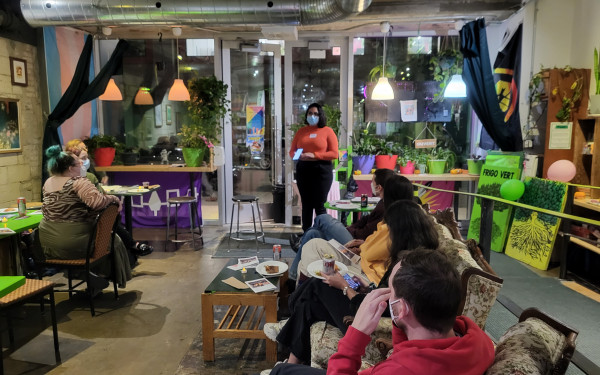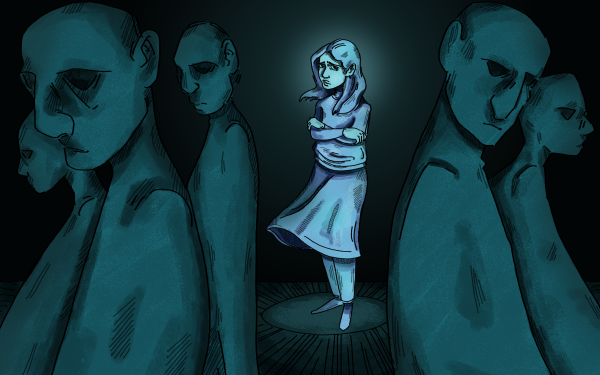Student sent to hospital after SARC counselling session
Resources for survivors are lacking at Concordia, advocates say
During the Winter 2023 semester, Ben, a first-year Concordia student who asked to remain anonymous for safety reasons, was living through his toughest week.
After publicly coming out as gay, he lost many of his university friends. Because of the toll this experience took on his mental health, he decided he wanted to relieve some pressure and feel less alone.
Ben went on Grindr and found a date, but made it clear from the beginning that he was not interested in having sex. Once he arrived at his date’s house, the perpetrator started taking off Ben’s clothing without consent and demanded oral sex.
“It all happened so quickly,” said Ben. “I just froze, and then he stripped me naked. I told him [...] to stop three times, and he just couldn't stop.”
After he left the perpetrator’s house, Ben sent him a text demanding an apology, but in response received a cynical text denying the events.
Ben filed a complaint with the police and has yet to hear back from them about his case.
Three days after the event, Ben decided to look into what resources Concordia provided for sexual violence victims. That is how he found the Sexual Assault Resource Centre (SARC). He reached out to them and was offered counselling services.
Ben described his first impression of SARC as “not very resourceful. If you don't ask specifically what they can do, they won't say anything,” he said.
Nevertheless, Ben returned for a second session, during which he mentioned he had been experiencing suicidal ideation. He made it clear to his counsellor that he would never take his own life because he did not want to leave his family.
The counsellor’s immediate response was to call an ambulance, despite Ben’s insistence that he would not harm himself. “I wasn't given an option to just go [home]. She coerced me into either going to a hospital or calling my parents,” he said.
The counsellor then called campus security and escorted Ben to the ambulance, which drove him to the Montreal General Hospital. “I was escorted out with two security guards. A bunch of students saw me. It was really, really embarrassing,” he said.
After waiting several hours at the hospital, he decided to head home. Once he reached his house, a police car was waiting for him. “Once you are put on suicide watch, if you leave the hospital, you are technically still ‘under arrest,’” he said. “It was really painful for both my parents and me to experience that. I was escorted out of my own house [into] a police car.”
The police officers drove him to Jean-Talon Hospital, where he was locked in a room by himself. “I freaked out,” he said. Ben stayed at the hospital for 12 hours before being allowed to go home.
The incident didn’t deter him from going to a third counselling session at SARC because he felt the experience varied “appointment by appointment.” He added that he felt he was always reaching out to SARC first, and that “there is no care for the student.”
Once in counselling, Ben explained what happened to him during his visit to Jean-Talon Hospital and added that he still felt suicidal. The counsellor once again panicked. In order to avoid reliving the same experience, Ben asked if he could call Suicide Action Montreal. That way, he could leave without being escorted by security or go to the hospital. “She watched me call Suicide Action and started talking with them [...] I hung up as soon as I walked out of the room,” he said.
After his experience, Ben dropped all his courses, as he didn’t feel safe on campus or around SARC anymore.
According to Concordia’s official spokesperson, “SARC staff are trained to respond in a trauma-informed manner. SARC social workers are experienced and trained professionals who belong to a professional order and receive clinical supervision as well as supervision from the SARC manager,” she said in an email.
However, Hannah Jackson, the external coordinator at the Concordia Student Union, said that SARC’s treatment of Ben showed a complete lack of proper counsellor training.
Jackson was a political educator for The Sexual Assault Centre in the McGill Students’ Society (SACOMSS) between 2019 to 2021 and has done several assisted suicide prevention trainings.
Jackson explained that the counsellor’s panic comes from the Quebec mandatory reporting law which dictates a medical professional’s obligation to report when a patient is in imminent danger.
“People have really poor training and they don't understand that suicidality is a spectrum,” she said. She continued to explain that the counsellor’s reaction is a very quick way to lose a victim’s trust. “It undermines trust because you're not centering the person and their feelings anymore,” said Jackson.
For Jackson, the incident provided proof of issues and lack of knowledge on suicide prevention in Montreal and at Concordia. “It is a greater societal problem in which we re-traumatize survivors of sexual violence in the exact same way that the original violence does, which is not believing that people have the agency to determine what they can do with themselves,” she said.
In a previous version of this article, there was an error in the percentage of dissatisfaction with SARC services. The article claimed the rate of dissatisfaction was 70 per cent. The statistic was incorrect. The Link regrets this error.
This article originally appeared in Volume 44, Issue 4, published October 17, 2023.

.png)





